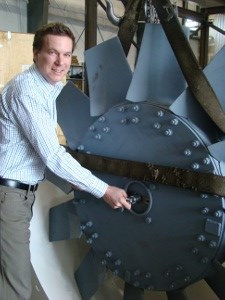By James Neeley
It's the dream of most children playing with LEGOs to build innovatively designed pieces that are functional, well, at least those children who have a knack for invention.
Turns out the little boy in some men never grows up and for Ionic Engineering, that's a good thing.
"We've had a lot of fun and built some really cool stuff," said Steve Matuch, the co-founder of Ionic Engineering Ltd. who admits he still plays within his 40 person engineering firm, but the pieces have become a little bigger.
A decade ago, Matuch began working with a remote controlled car design for the Inco copper refinery in his garage. When that was completed another project came along and bit by bit, he prepared himself for his own business that would assist companies the world over.
"It progresses slowly," he said, with one phone call at a time.
"With every phone call you get a little better and learn how to do bigger projects."
What Matuch and engineer Eric Haapamaki "get off on," is building machines.
"I get a kick out of it," Matuch added.
"Where you had a line before with 10 people working it, swinging sledgehammers and at the end of the day you have one guy sitting behind a console pushing buttons and you think 'wow,' and (I) did that. It's a lot of fun."
Most companies, Matuch said, succeed by incremental innovations, the next model of existing technology that is bigger and faster.
"We are one of the few companies that take on things wholesale right from the ground up. Something that has point blank never been done before," he said.
Ionic works in unchartered territory of the mining field, Matuch added, with much of its focus in the auto and electric sectors using automation.
"What we often do here is sit down with a blank piece of paper and say 'nobody has ever done this before. How do we do it,'" Matuch said, "and to do that is tremendously difficult."
Haapamaki likened the creative challenge to, "building the first car for the first time, every time."
“You make some mistakes, learn from those mistakes and then you improve on it."
Coupling ingenuity with the building blocks of experience leads to improvement, Haapamaki said.
"We take bits and pieces from our other experiences and use that to make this new type of machine and we get better at it."
Being in Northern Ontario is not an impediment to accessing world markets, Matuch said.
"Seventy per cent of our business these days is exported to global markets."
"Us being in Sudbury is an advantage," Haapamaki added. "We take that knowledge and expertise in mining and we export it to other companies all over the world. A little bit of a role reversal than what you typically see."
It wasn't until the 1980s mining operations in Northern Ontario could acquire the machinery and technology needed in Northern Ontario, Matuch said.
"Now Sudbury has almost developed into a centre for technologies for these industries and the flow is starting to go the other way."
Ionic is helping to create that momentum in spite of the economic tide.
"Economies like this aren't bad for companies. It's painful, but it forces you to look at what you do and say 'Where else can we sell this? Where else can we sell what we have learned? What other industries? What other businesses?'”
The market is slow, but Ionic is quoting work every week, Haapamaki said. From Category 4 Safety Systems headed to refineries in Belgium to Anode processing systems for Chinese coal mines, and to the Kidd Process Cathode Stripping System built for Xstrata Technology.
http://www.ionic-eng.com/




